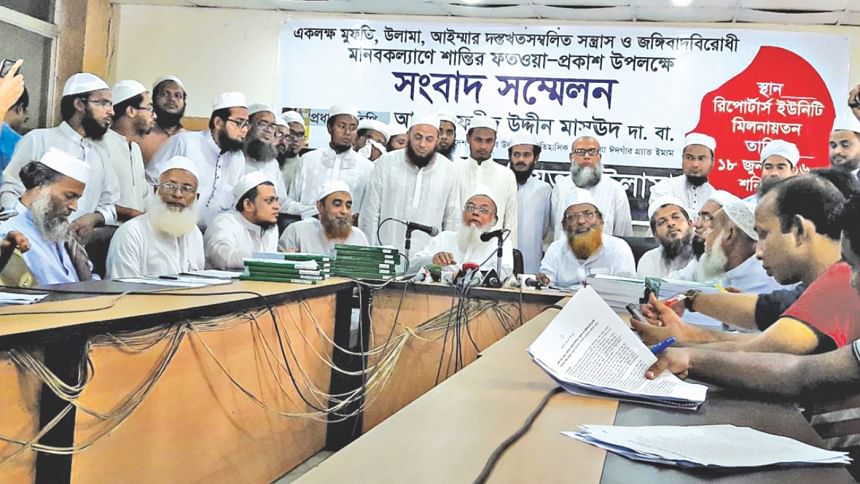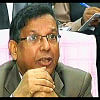Terrorism, killings forbidden in Islam

After issuing a set of fatwas against militancy, a section of Islamic scholars yesterday stressed the need for taking their message to the masses to stop militancy and violence in the name of religion.
Bangladesh Jamiyatul Ulama (BJU), a national body of Islamic scholars, issued the fatwas through a press conference at Dhaka Reporters Unity, saying that those killing people in the name of religion were heading for hell.
The edicts came in the wake of continued attacks on religious minorities, intellectuals and secular writers across the country. Such killings, mostly by hacking with machetes, have risen over the past few months.
Signatures of 1,01,850 Islamic clerics, including 9,320 women, have been collected in support of the fatwas, prepared in light of the Quran and Hadith.
Explaining the initiative, Farid Uddin Masoud, chairman of Jamiyatul Ulama, said the law enforcement agencies alone cannot resist the criminals who are ready to kill themselves in the name of religion. The first thing needed is to dispel the militants' misconceptions about Islam, he added.
Fatwas are more powerful than one lakh weapons and they will be able to curb terrorism largely, said Masoud, also the convenor of an 11-memebr panel of scholars.
He urged imams, ulema, teachers, social workers, NGO workers and people with good conscience to spread out the edicts. "We have to take stand unitedly against this [terrorism] to save ourselves."
Masoud, also the grand imam of the country's largest Eid congregation at Sholakia of Kishoreganj, said it is a matter of great regret that some criminals were resorting to terrorism and spreading panic in the name of Islam to serve their own interests. But Islam never supports terrorism and thus it is illegal and forbidden in the religion.
Killing non-Muslims and carrying out attacks on churches or temples are heinous crimes, he added.
The fatwas say killing of innocent people indiscriminately is not legal in Islam; killing of children, women, and old and weak people who don't take part in a war is strictly prohibited, even during the war it is not justified; killing people during prayers is a heinous and severe crime; whoever kills a believer intentionally, he will end in eternal hell in recompense; and suicide and suicide killings are strictly forbidden in Islam. Even attending janazas of those who committed suicide has been forbidden in the religion.
As Islam forbids terrorism and spreading of panic, it could never be the way to go to heaven. This will absolutely lead terrorists to hell. Those who have been involved in terrorism thinking that it would take them to heaven should apologise to the Almighty and return to the path of Islam. Allah doesn't like those who create chaos and violence, the edicts add.
The fatwas would come up in the sermons in mosques. The Islamic scholars have planned to hold councils in districts, Masoud said, urging all to spread the message through social media.
The Jamiyatul Ulama will assess the reaction of the society after a month, he added.
If one crore copies of the edicts can be distributed across the country, the society and the country would be benefitted, he observed.
Masoud called upon the rich people to come forward to contribute in this regard. He said copies of the edicts would be sent to President Abdul Hamid, Prime Minister Sheikh Hasina, the United Nations and the OIC.
All the imams were with the move, except for those "siding with militancy". Hefajat-e-Islam Secretary General Junaid Babunagari was among the signatories to the call, Masoud added.
HEFAJAT CONDEMNS KILLINGS
Hefajat leader Babunagari at a press conference at Chittagong Press Club yesterday condemned the recent targeted killings, saying such activities go against the spirit of Islam, reports our correspondent.
Citing a Hadith, he said the person who oppresses and kills innocent people from religious minorities cannot even smell the fragrance of Jannah.
"Those who have been instigating communal activities are against the country's independence and sovereignty," Babunagari said.
He demanded the government arrest the "real culprits" and mete out punishment to them after proper investigation.
The Hefajat secretary general also pressed for repeal of the Education Policy 2010 and Education Act 2016, terming those "anti-Islamic".
The Qawmi madrasa-based Islamist organisation in 2013 had raised 13-point demands, which included scrapping of "anti-Islam" women and education policies and making Islamic education mandatory from primary to higher secondary levels.

 For all latest news, follow The Daily Star's Google News channel.
For all latest news, follow The Daily Star's Google News channel. 








Comments